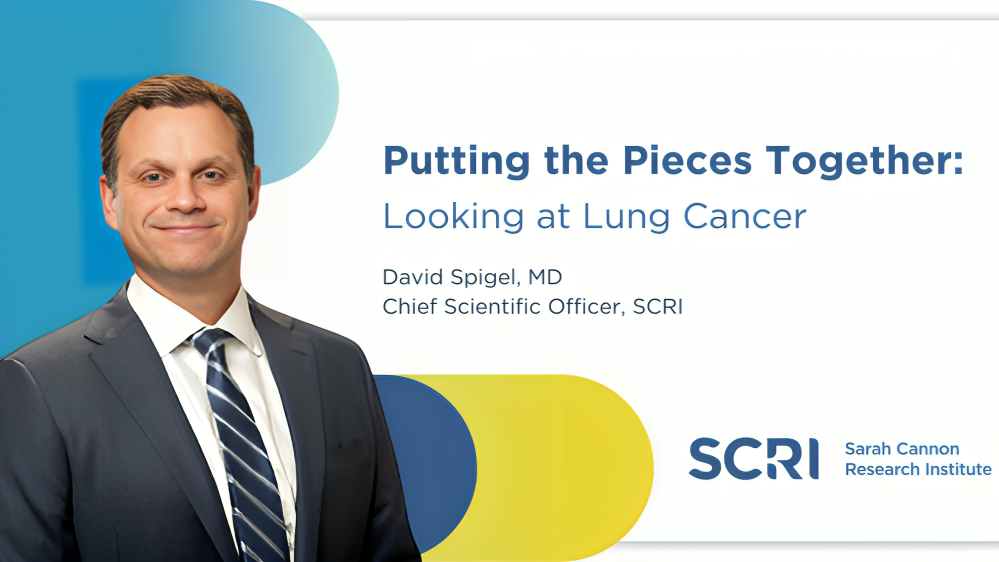David R. Spigel, Chief Scientific Officer at Sarah Cannon Research Institute, shared a post on LinkedIn:
“Collaboration is the cornerstone of ground breaking research. For over 30 years, Sarah Cannon Research Institute has been leading the charge in oncology research, conducting clinical trials in communities nationwide. Our mission is to ensure that participation in a clinical trial is the first option for fighting cancer—not the last. During Lung Cancer Awareness Month, I sat down with our team, to reflect on the strides we’ve made in understanding and treating lung cancer and look ahead to the work that still lies before us.
SCRI: Lung Cancer Awareness Month is the perfect time to think about how far we’ve come. How would you describe the current state of lung cancer research?
I like to think that lung cancer research is akin to assembling a complex puzzle. Each piece—whether it’s a targeted study, a new discovery, or a breakthrough in treatment—plays a critical role in revealing the larger picture. We’ve made tremendous strides, especially over the last decade with new therapeutic options aimed at improving the patient experience and ultimately extending the survival rate. We just haven’t figured out what the full puzzle looks like yet.
At SCRI, we are committed to not only identifying these pieces, but also connecting them in meaningful ways that bring us closer to transformative cancer care for patients.
SCRI: We’ve seen a lot of new “puzzle pieces” added to the table this year. Which new advancements are you most excited about?
Clinical trials and ongoing research have led to so many top advancements including biomarker testing, immunotherapy, targeted therapies, and the role of digital technology in enhancing patient care.
The rise of biomarker testing is revolutionizing how we understand and treat patients lung cancer. Each case is unique, which means the treatment must be too. Biomarker testing gives us the additional insight we need to more accurately predict which treatment option may be most effective.
Targeted therapies offer a unique approach, targeting only cancer cells and leaving the surrounding healthy cells less affected. Current therapies include anaplastic lymphoma kinase (ALK) inhibitors, epidermal growth factor receptor (EGFR) inhibitors, ROS proto-oncogene 1 (ROS1) inhibitors, v-raf murine sarcoma viral oncogene homolog B (B-Raf) inhibitors, among others. All of these are paving the way for more effective treatments with fewer side effects.
The CROWN study revealed the longest progression-free survival outcomes for next generation ALK tyrosine kinase inhibitor (TKI) and almost completely prevented central nervous system metastases. These results are among the best long-term outcomes of any TKI seen in lung cancer!
Immunotherapy has also shown promise for patients with lung cancer, particularly those with high levels of PD-L1.
From an immunotherapy standpoint, a new option offers a potential breakthrough for patients with stage I–III limited-stage small-cell lung cancer. Studies suggest it can help patients live nearly two years longer. This is especially exciting because treatment durability is a persistent issue in solid tumors.
As we look to improve patient care, another recent study highlighted the role of digital technology in enhancing patient care, demonstrating that virtual consultations can be just as effective as in-person visits. This is a crucial step towards making cancer care more accessible and equitable for all patients, particularly those with fewer resources or less availability to travel to the doctor.
SCRI: What type of challenges do lung cancer patients face that others may not?
Lung cancer remains the leading cause of cancer death among men and women in the United States, yet it is often stigmatized due to its association with smoking. While smoking is a known risk factor, lung cancer can develop due to many other causes, including radon exposure, hazardous chemicals, particle pollution, and genetic factors, among others.
Our role as oncologists, researchers, and caregivers is not only to treat the disease, but also to combat the stigma surrounding it. By raising awareness and educating the public about the diverse causes of lung cancer, we can ensure that every patient receives the care and compassion they deserve.
SCRI: We know that clinical trials are critical for advancing patient care. How do you see SCRI fitting into that piece of the puzzle?
Expanding access to clinical trials is a monumental task, but it’s one that SCRI is uniquely equipped to tackle. With our presence in over 250 locations across 24 states, we are bringing innovative cancer treatments directly to patients in their communities.
Our research is only possible because of the courage and willingness of patients who participate in clinical trials. These trials are not just about developing new treatments—they’re about offering hope today and for future generations.
We may not yet have all the pieces of the lung cancer puzzle, but each day brings us closer. Every new therapy, every advancement—whether big or small—moves us forward. Innovation in cancer treatment is built on curiosity, persistence, and the understanding that every discovery, no matter how minor it seems, is a victory worth celebrating. At SCRI, we embrace the challenges ahead, knowing that together, we can find the missing pieces and continue advancing the fight against lung cancer.
Every step forward in research brings us closer to unlocking the full picture of lung cancer treatment. We remain committed to pushing the boundaries of innovation, ensuring that every patient has access to the latest advancements in care. The future of lung cancer treatment holds incredible promise, and through collaboration, clinical trials, and ground breaking research, we are transforming hope into reality—one discovery at a time.”
For more Updates, Follow OncoDaily.


